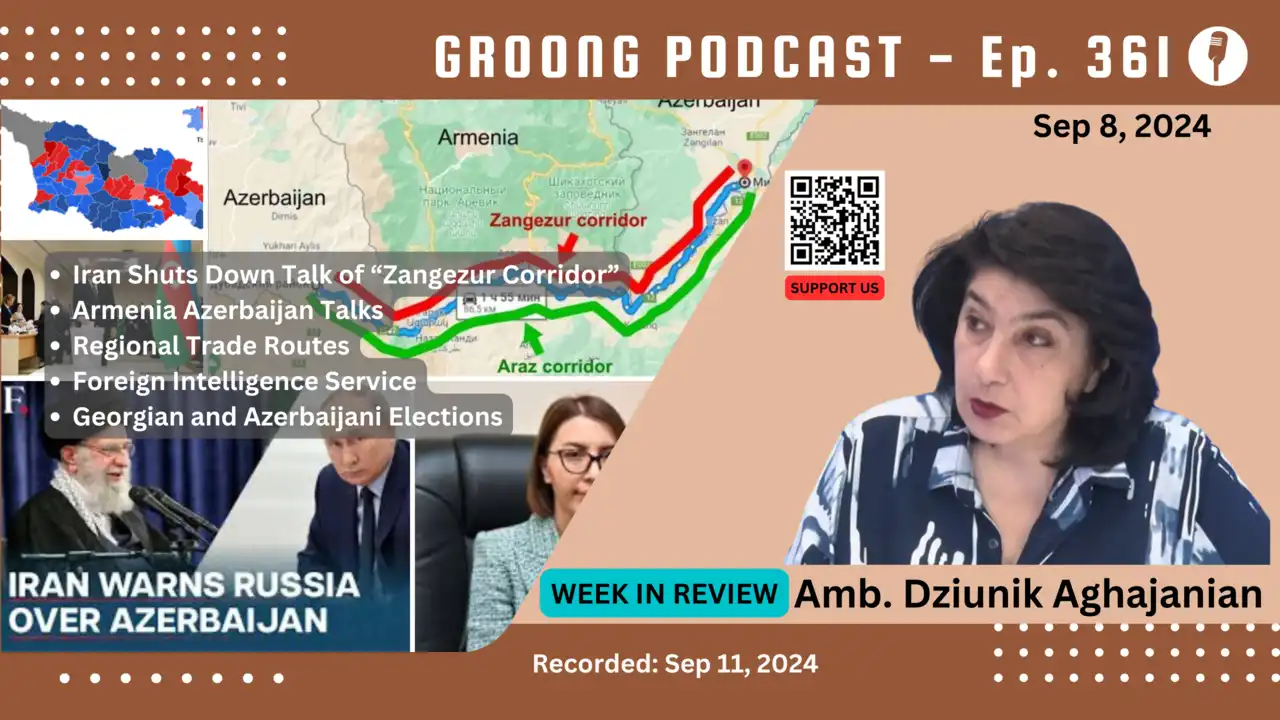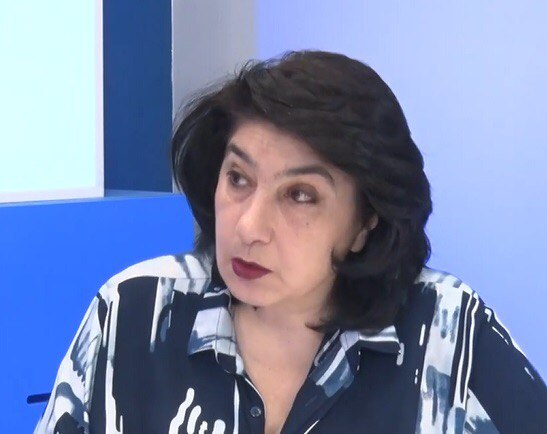Dziunik Aghajanian - Iran Shuts Down Talk Of Zangezur Corridor, Regional Trade Routes, Accountability and the Foreign Intelligence Service, Georgian and Azerbaijani Elections | Ep 361 - Sep 8, 2024 [EP361]
Posted on Thursday, Sep 12, 2024 | Category: Armenia, Azerbaijan, Borders, BRICS, Iran | Series: wir
Groong Links:
Guest:
Topics:
- Iran Shuts Down Talk of “Zangezur Corridor”
- Armenia Azerbaijan Talks
- Iran Armenia Trade / BRICS
- Foreign Intelligence Service
- Georgian and Azerbaijani Elections
Episode 361 | Recorded: September 11, 2024
Show Notes
Topics This Week
Iran Shuts Down “Zangezur Corridor Dreams”
Iran Warns Russia to Back Off
Following Putin’s visit to Baku a couple of weeks ago, Russia’s rhetoric became very harsh about Armenia blocking transportation links through Syunik, which Azerbaijan and Turkey call the “Zangezur Corridor”. We also know that there is significant pressure from the West (whether it is the EU or the US) on Armenia and Azerbaijan to open up Armenia to Turkish-Azeri connectivity.
Given Iran’s previous stance, it came as no surprise when, last week, Iran sent a very clear message to Russia to back off from pressuring Armenia into compromising its sovereignty for a Turkish-Azeri corridor. The Iranian Foreign Minister went to the unusual step of summoning the Russian ambassador.
Questions:
- Why is Russia so motivated to have control over this corridor through Armenia? What’s in it for Russia?
- Has Russia promised Azerbaijan and Turkey a corridor to keep them as “neutral” as possible through its confrontations with the West?
- Why does Iran perceive a Russian-controlled corridor or a western managed corridor as part of redrawing boundaries?
- Aren’t Iran and Russia allies in this case?
The Pashinyan team has been touting this idea that private (undoubtedly “western”) security companies could be involved in some way. But there’s also confusion around this aspect. First there were reports that Pashinyan said that it’d be acceptable to have “private security companies” “controlling” transportation links through Syunik.
But earlier on Monday, Ararat Mirzoyan clarified that the private security company would only accompany passengers and cargo on trains and appeared to rule out any form of “control”.
Questions:
- What is the nature of this idea?
- What level of trust will be given to this company? What does “control” mean anyway?
Armenia Azerbaijan Talks
Given all this wrangling over Armenia’s south, last week Aliyev said that 80% of the so-called “peace agreement” with Armenia is agreed upon. He again repeated that changing the Armenian constitution as a demand is still not fulfilled.
Questions:
- We’ve talked a lot about the constitution topic. What else is up in the air?
- Both countries say that around 13 out of 1000 kilometers of border have been delimited. What is the outlook on the demarcation business?
In his press conference on August 31, Pashinyan said that raising the issue of the rights and security of the refugees from Artsakh contradicts the national security of Armenia. In response, Artsakh president Samvel Shahramanyan vowed to not jeopardize Armenia’s national security in his quest for a mass repatriation of Artsakhtsis back to their homeland.
Questions:
- What was this back and forth between Pashinyan and Shahramanyan all about?
- Is Shahramanyan really working on the return, or rights and security of Artsakhtsis with Azerbaijan?
Trade
Iran - Armenia Trade
Amidst all this national insecurity, Armenia and Iran are currently doing over $700 million of trade across their common border. Iran is doubling down on its investments in Armenia and announced plans to invest $3 billion. Reportedly 400 trucks travel between the two countries daily, so quadrupling that means 1600 trucks a day.
Questions:
- Is Armenia’s infrastructure capable of sustaining that kind of traffic, and is there work being done to improve the situation?
- What is the main focus of Iran’s trade with Armenia? And is that trade WITH Armenia, or THROUGH Armenia?
BRICS
The day after Putin’s visit to Baku Azerbaijan applied for membership in BRICS. Turkey is also interested and testing the waters with conflicting messages from various high level officials. Georgia has not applied but has struck up a strategic partnership with China and is building a major port on the Black Sea. Iran and Russia are members of BRICS. Armenia has not applied, but is clearly interested.
Questions:
- How is BRICS changing the geo-economics of the South Caucasus?
- Is BRICS a competing organization and market vis-à-vis the EU, or is it a cooperative one? Can countries be members of the EU, as well as BRICS?
- We’ve already heard that the EU thinks membership in the EAEU is ultimately incompatible with the EU, but perhaps that is for the time when Russia and the West are engaged in a zero-sum crisis in Ukraine.
Accountability and the Foreign Intelligence Service
Armenia’s National Security Service, the NSS, which has sole jurisdiction over state secrets and who gets to see what, is slowly being gutted by Pashinyan and his government. In 2022 it lost its major crime and corruption investigative unit to the so-called “Investigative Committee”, and its unit for protecting high ranking officials to a unit directly reporting to Pashinyan.
Also in 2022, former ombudswoman Kristine Grigoryan was appointed as the head of the newly created Foreign Intelligence Service (FIS). Now Grigoryan and the FIS want to remove the NSS from its oversight of state secrets.
Questions:
- There is always a core issue to these seemingly bureaucratic and boring organizational shuffles. What is the deal with all these secret service shuffles?
Georgian and Azerbaijani Elections
On October 26 Georgia will hold parliamentary elections. While Georgian Dream (GD) is leading the polls with 59% of the vote, the rhetoric and political temperature in the country is very high. There are even EU parliamentarians in the country warning the government to take down their “Foreign Agent” law, which they call “Putin’s Law”, and supporting the opposition. Germany has warned that unless their demands are met Georgia’s EU accession processes will remain frozen. So this election is being painted as a pivot to the west or to the east.
Question:
- What’s at stake in Georgia and what’s at stake for Armenia, in these October Georgian parliamentary elections?
Azerbaijan held parliamentary elections on September 1. They were roundly criticized by the west as being held in a “restrictive political & legal environment, devoid of competition.” Aliyev’s party and people won the day.
Question:
- Why was this so-called “election” even held? As a show, it just showed how undemocratic Azerbaijan is, as a classic petro-dictatorship. As a process, it doesn’t look like anything has changed in the country. So what was the purpose of it?
Thoughts from the Participants
- Dziunik: Everyone should see «Անավարտ մարտը», a documentary on the ethnic cleansing of Artsakh, which I saw on Artsakh’s Independence day, Sep. 2.
- Hovik: Do not let Azerbaijan greenwash the ethnic cleansing of Artsakh. Ask your representatives to disclaim, and protest and not attend #COP29. Also, do not believe that moving Armen Ashotyan to house arrest means he is free. Remain vigilant about political prisoners in Armenia.
Wrap-up
That’s our Week in Review, we hope you found it helpful. We invite your feedback and your suggestions, you can find us on most social media and podcast platforms.
Thanks to Laura Osborn for the music on our podcasts.
Guests

Dziunik Aghajanian
Ms. Dziunik Aghajanian has served Armenia through the ranks of the Ministry of Foreign Affairs, and most recently as a diplomat, as Armenia’s Ambassador to such countries as the Netherlands, Malaysia, and Indonesia. She received her education at Yerevan State University, Columbia University in NY, and Uppsala University in Sweden.
Hosts

Hovik Manucharyan
Hovik Manucharyan is an information security engineer who moved from Seattle to Armenia in 2022. He co-founded the ANN/Groong podcast in 2020 and has been a contributor to Groong News since the late 1990s.
Disclaimer: The views expressed by Hovik Manucharyan on the ANN/Groong podcast are his own and do not necessarily reflect the opinions of his employer or any other organization.

Asbed Bedrossian
Asbed Bedrossian is an IT professional, and for years oversaw the central IT enterprise infrastructure and services at USC. His decades of experience spanned across IT strategy, enterprise architecture, infrastructure, cybersecurity, enterprise applications, data center operations, high performance computing, ITSM, ITPM, and more.
Asbed founded the Armenian News Network Groong circa 1989/1990, and co-founded the ANN/Groong podcast in 2020.